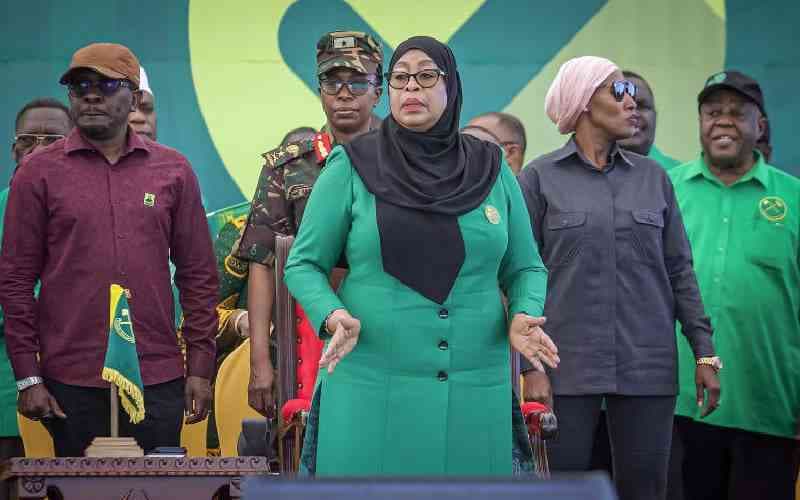We're loading the full news article for you. This includes the article content, images, author information, and related articles.
President Samia Suluhu Hassan is poised for a decisive win in Tanzania's general election on Wednesday, 29 October 2025, a contest critics argue is marred by the systematic suppression of opposition parties, raising significant concerns for democratic processes within the East African Community.

Tanzanian President Samia Suluhu Hassan is expected to secure a second term in the general election scheduled for Wednesday, 29 October 2025. Her path to victory appears largely unobstructed following a period marked by what international observers and human rights groups have described as a severe crackdown on political dissent. The election, which will see over 37 million registered voters cast ballots for the president, members of parliament, and local councillors, proceeds under a cloud of controversy, with the main opposition party, Chama cha Demokrasia na Maendeleo (CHADEMA), barred from participating.
The political landscape leading up to the election has been dramatically reshaped by actions against opposition figures. CHADEMA, the leading opposition party, was disqualified by the Independent National Electoral Commission (INEC) after it refused to sign an electoral code of conduct in April 2025, a move the party argued was a protest against the lack of meaningful electoral reforms. The party's chairman, Tundu Lissu, a prominent critic of the government, was arrested in April 2025 and faces treason charges for advocating for an election boycott in the absence of reforms. This has effectively removed President Samia's most significant challenger from the race.
Further narrowing the field, the presidential candidate for the Alliance for Change and Transparency (ACT-Wazalendo), Luhaga Mpina, was also barred from contesting, leaving the ruling Chama Cha Mapinduzi (CCM) party largely unchallenged at the presidential level. While ACT-Wazalendo will contest parliamentary and local seats, the disqualification of its presidential candidate has significantly weakened the opposition's overall strength.
Human rights organizations have voiced grave concerns about the pre-election environment. A September 2025 report by Human Rights Watch documented an intensification of political repression, including arbitrary arrests, assaults, and enforced disappearances of opposition members, activists, and journalists. Amnesty International echoed these concerns in an October 2025 briefing, stating that authorities have fostered a "climate of fear" to suppress dissent and civic engagement. The Legal and Human Rights Centre, a Tanzanian organization, has recorded approximately 100 cases of abductions and enforced disappearances between 2015 and February 2025. The United States Department of State's 2024 report also highlighted significant human rights issues, including unlawful killings and restrictions on media freedom.
In early 2024, the Tanzanian parliament passed new electoral laws, including the Independent National Electoral Commission Act. The government presented these as measures to improve transparency. However, critics argue the reforms were cosmetic and failed to guarantee the electoral commission's independence from government influence. CHADEMA’s “No Reforms, No Election” campaign was rooted in the belief that the existing legal framework unfairly benefits the incumbent CCM.
Despite the tense political climate, international and regional bodies have deployed observer missions. The East African Community (EAC) has sent a 67-member team, led by former Ugandan Vice President Dr. Speciosa Wandira Kazibwe, to assess the electoral process. The African Union and the Southern African Development Community (SADC) also have missions on the ground. The presence of these observers is crucial, though their ultimate impact on the perceived legitimacy of the election remains to be seen, especially given the exclusion of major opposition players.
The political developments in Tanzania hold significant implications for the East African region. As a key member of the EAC, Tanzania's political stability is crucial for regional integration, trade, and security. President Samia, since taking office in March 2021 after the death of John Magufuli, has pursued a more internationalist foreign policy, improving relations with neighbours like Kenya. However, a slide towards authoritarianism, as suggested by the pre-election crackdown, could strain diplomatic ties and undermine the EAC's founding principles of good governance and democracy.
For Kenya, a stable and democratic Tanzania is a vital economic partner. Any post-election instability could disrupt cross-border trade and investment. Furthermore, the handling of the opposition in Tanzania sets a precedent that will be closely watched across a region where democratic norms are often contested. The outcome and its aftermath will be a key test for President Samia's leadership and will likely shape Tanzania's role within the East African Community for the next five years.
Keep the conversation in one place—threads here stay linked to the story and in the forums.
Sign in to start a discussion
Start a conversation about this story and keep it linked here.
Other hot threads
E-sports and Gaming Community in Kenya
Active 9 months ago
The Role of Technology in Modern Agriculture (AgriTech)
Active 9 months ago
Popular Recreational Activities Across Counties
Active 9 months ago
Investing in Youth Sports Development Programs
Active 9 months ago
Key figures and persons of interest featured in this article